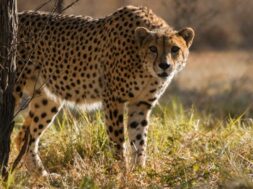
Manas Dasgupta
NEW DELHI, Apr 28: The death of two cheetahs at the Kuno national park in Madhya Pradesh is considered to be “within the expected mortality rate” for a project of this nature under which the animals were brought from Namibia and South Africa and relocated in India in Kuno.
Uday, a six-year-old cheetah who was brought to India from South Africa, died on April 23. Earlier on March 27, five-year-old Sasha, one of the eight cheetahs brought to India from Namibia, succumbed to kidney failure after she was diagnosed with a kidney infection in January.
The cause of death of Uday was given as cardio-pulmonary failure. Uday was among the 12 cheetahs flown in from South Africa in February as part of the country’s ambitious cheetah reintroduction programme. The six-year-old cheetah was healthy when brought to India, but was seen struggling to walk a day earlier and hours later it died.
“As per the preliminary observation by veterinarians who performed the autopsy of the male cheetah, he died of cardio-pulmonary failure,” said Principal Chief Conservator of Forest (PCCF), Wildlife, JS Chauhan. A panel of five experts, comprising a forensic expert each from Jabalpur and Bhopal, carried out the necropsy.
“Blood and other vital organ samples of the cheetah have been sent for advanced testing at the School of Wildlife Forensic and Health at Nanaji Deshmukh Veterinary Science University in Jabalpur. Only after the results of the advanced tests are known, the actual reason behind the cheetah’s death can be ascertained,” an official statement said.
The Department of Forestry, Fisheries and the Environment (DFFE) South Africa said the deaths of two cheetahs in Madhya Pradesh’s Kuno National Park were “within expected mortality rates for a project of this nature.”
In a statement issued by the Department of Forestry, Fisheries and the Environment (DFFE) South Africa said, “The cheetah joined eight of the mammals relocated to India’s Kuno National Park from Namibia in September 2022. The two cheetah deaths (one from Namibia and one from South Africa) observed to date are within expected mortality rates for a project of this nature.”
The cheetahs were relocated to Kuno National Park, Madhya Pradesh as part of an initiative to expand the cheetah meta-population and to reintroduce cheetahs to a former range state. The statement further said, “Large carnivore reintroductions are extremely complex and inherently risky operations. This is a critical phase of the project, with cheetahs being released into larger environments where there is increasingly less control over their day-to-day wellbeing.”
According to the statement, the risks for injury and mortality will be increasing, and these risks are factored into the reintroduction plan. “The Department of Forestry, Fisheries and the Environment (DFFE) awaits a diagnosis (an autopsy) for the death of the cheetah, but there is no indication that it is any form of infectious disease or that there is a similar threat to any of the other cheetahs”, the government of South Africa said in a statement.
The statement further added, “All the South African cheetahs are in larger enclosures and are closely monitored twice daily. As they are wild cheetahs, their behaviour, movements, and body condition must be evaluated from a distance, limiting the ability of teams on the ground to gain precise knowledge of their health status.”
“The remaining eleven South African cheetahs will be released into free-ranging conditions over the next two months. Kuno is an unfenced protected area that supports a high density of competing predators including leopards, wolves, sloth bears, and striped hyenas. It is anticipated that, as observed with cheetah reintroductions in Africa, a few of the founder population may be lost within the first-year post-release”, the statement said.
The statement added, “Many of the released cheetahs will escape the boundaries of Kuno National Park and may have to go through short-term stress during the recapture process. Once the cheetahs have established home ranges, the situation will stabilise.”
‘Project Cheetah’ was launched last September, decades after the species went extinct in India. Earlier this year, the governments of South Africa and India signed a Memorandum of Understanding (MoU) on Cooperation on the Re-introduction of Cheetah to India. The MoU facilitates cooperation between the two countries to establish a viable and secure cheetah population in India; promotes conservation and ensures that expertise is shared and exchanged, and capacity is built, to promote cheetah conservation. This includes human-wildlife conflict resolution, capture and translocation of wildlife and community participation in conservation in the two countries.













